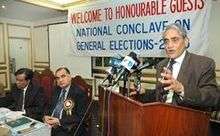Syed Afzal Haider

Syed Afzal Haider (Urdu: سید افضل حیدر ) is a well-known Pakistani legal figure, who was Pakistan's caretaker Law, Justice and Parliamentary Affairs minister and is also an author of some note.
Early life and education
Haider was born in Pakpattan, Punjab, Pakistan in 1930, the son of Syed Muhammad Shah, Advocate, in a prominent Syed (Sayyid) family of the area, while his mother's family was the famous Hakimkhana of Lahore.[1] He received his early education (1936-1946) from this town and afterwards, he did his Intermediate Higher Secondary study at FC College, then graduated with a Bachelor of Arts degree from Government College Lahore, and afterwards graduated as a lawyer from the Punjab University Law College. He later also trained as a barrister from the Inns of Court, London, and has been practicing law since the 1950s. In addition, he has also been involved in various cultural and literary activities.
Career
Apart from his legal concerns, Syed Afzal Haider also participates in cultural and social activities. In 1987 he conducted the “Baba Farid International Conference", to commemorate the work of the famous South Asian Sufi saint, Hazrat Baba Fariduddin Ganjshakar.[2] With regard to the Law and Constitution he participated in many international conferences and delivered many lectures on Human Rights. From 1990-2003, he remained Senior Member of the Council for Islamic Ideology in Pakistan. Many programs of his have been telecast from different TV channels on Law, Mysticism, the constitution and on religious teachings.
His English and Urdu publications enfold writings on Imam Khomeini, the Bhutto Trial, the Shariat Bill, Rehmatu-ul-Lil Alameen, F.I.R and many more. Hundreds of his articles has been published on many constitutional and legal topics. Now, he is one of the most senior faculty members of Qauid-Azam-Law college, Lahore. Syed Afzal Haider is a Professor of Islamic Jurisprudence in Quaid-e-Azam Law college, Lahore.
Anand Karaj Act
Syed Afzal Haider was actively involved in the passage of the Sikh Marriage Ordinance of 2008 (also known as the 'Anand Karaj Act'). This ordinance marked Pakistan as being the first country in the world where Sikhs could get their marriages registered, based on their religion.
Judgments
On March 26, 2008 Syed Afzal Haider, who was law minister in the caretaker cabinet, took oath as judge of the Federal Shariat Court of Pakistan. In 2010, he gave a famous verdict in Mian Abdur Razzaq Aamir v. Federal Government,[3] holding sections of the Women's Protection Act of 2006 unconstitutional. The decision gave an expansive definition of the term "Hudood" in the Constitution, and asserted the Federal Shariat Court's "exclusive jurisdiction" over matters not just consisting of Hudood, but also "relating to" Hudood. This definition of Hudood includes Tazir as well. The advocates of the Women's Protection Act have argued that the judgment has dismantled the Act's legal reforms.[4]
See also
References
- ↑ See article with mention of her family by Dr. Riffat Hassan, in daily 'Dawn', November 7th 2002, online at http://www.columbia.edu/itc/mealac/pritchett/00islam/links/txt_riffat_hasan.html/
- ↑ It is worth noting here that Haider is married into the family of this famous Sufi, whose shrine is at Pakpattan and is venerated by Muslims, Hindus and Sikhs equally. His own mother is from the famous Hakimkhana family of Lahore, and the late Hakim Ahmad Shuja was a maternal uncle, see reference above
- ↑ 2011 PLD FSC 1
- ↑ Butt, Qaiser (23 December 2010). "Women Protection Act: Top Islamic court rules against law". The Express Tribune. Retrieved 10 June 2011.